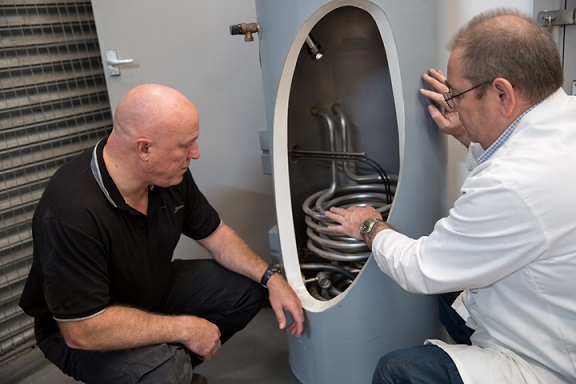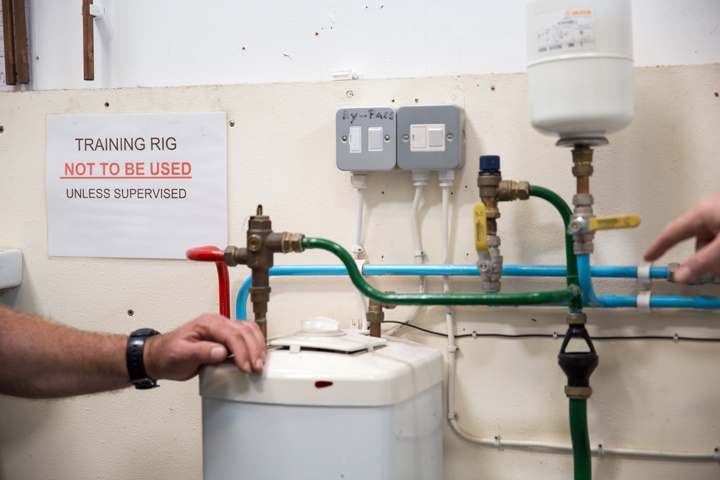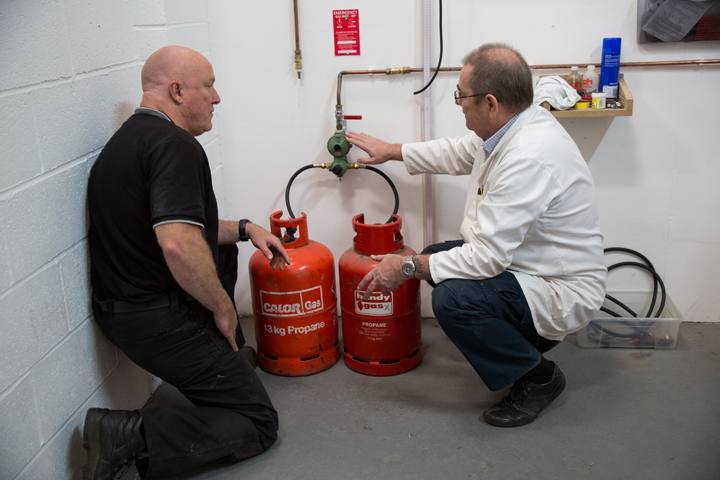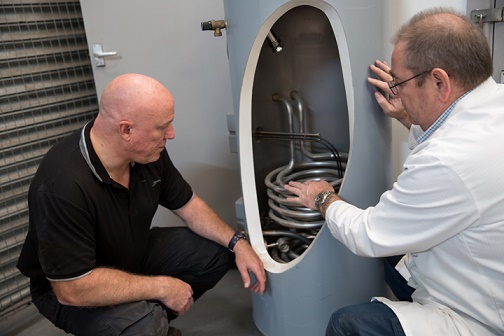
A man from Staffordshire has been sentenced to prison time after he performed gas work in someone's home with no experience or qualifications to do so. The man, named Colin Christoper Batchelor, conducted this gas work in September 2016. He:
- Removed an old boiler
- Installed a new boiler
- Installed a gas meter
- Connected pipework
All while being completely unregistered to do so!
When Health and Safety Executive (HSE) investigated this incident, they found that Mr Batchelor had performed gas work while claiming to his client that he was part of the Gas Safe register, when in fact, he was not. He was not competent to carry out the gas work that he did, and the result of his shoddy workmanship was a home left unsafe. Mr Batchelor failed to carry out any tests or examinations to verify that the installation was safe and gas-tight once his work was finished.
Mr Batchelor pleaded guilty to five separate breaches of the Gas Safety (Installation and Use) Regulations 1998 and was sentenced to 8 months imprisonment for each offence. That means, that Mr Bachelor's thoughtless actions have cost him over three years of his life!
After the hearing, HSE inspector, Dr Riley Roberts, said:
"The Gas Safe Register Exist to protect the public from people such as Colin Christopher Batchelor, who are prepared to work illegally, falsify records and carry out potentially dangerous gas work. Performing gas work without being competent to do so can be highly dangerous and lead to loss of life."
Don't risk being prosecuted like Mr Batchelor. Do a gas course with Access Training Academies and we will give you the skills and practical knowledge you need to become Gas Safe registered.
Browse Our Gas Courses Now >

It's widely known that gas engineers in the UK are legally required to join the Gas Safe Register before working on gas appliances. But do you know what the punishment is for carrying out gas work when you're not Gas Safe registered?
A Mr Stevens of Milton Keynes recently found out. The director of Master Plumbing Contractors Limited recently appeared before Aylesbury Crown Court, where he was sentenced to 300 hours of community service and ordered to pay costs of £15,000.
This sentence was handed down because Mr Stevens was working illegally when he installed a gas boiler (later found to have defects) at a property in Milton Keynes. The court heard that Mr Stevens had...
- Professed to be Gas Safe registered
- Worn a T-shirt bearing the Gas Safe logo
- Displayed the Gas Safe logo on his company van
...but an investigation by the Health & Safety Executive (HSE) found that, despite all appearances, Mr Stevens actually was not on the Gas Safe Register at the time the work was carried out.
Following the outcome of this hearing, HSE inspector Andrew McGill issued a statement warning "rogue gas fitters" that gas work is "difficult, specialised and potentially very dangerous", and that it should only be undertaken by "trained and competent engineers who are registered with Gas Safe".
How do you get on the Gas Safe Register?
In order to join the Gas Safe Register and avoid the penalties for illegal gas work, you will first need to pass your ACS assessment - and you won't be able to do that until you've learned the essential skills, theory and safety procedures that every professional gas engineer must know.
If you're thinking of joining the trade and making a living from gas work, we offer a selection of comprehensive gas courses here at Access Training Academies. You'll learn in a fully-equipped training centre under the supervision of an experienced gas engineer, and we'll help you to progress smoothly and quickly from learning the basics to preparing for your ACS assessment. We can also help with the reassessments that you'll have to complete every few years in order to stay on the Gas Safe Register.
Our Gas Courses > Speak to a Course Advisor >
READ MORE: How to Become Gas Safe Registered

If you want to have a career as a gas engineer, you'll first need to earn the qualifications that certify your ability to work safely and legally. One of these qualifications is the CCN1 gas qualification.
More...

Gas engineers are among the most in-demand tradespeople of all, and if you're willing to put in the work necessary to get certified and join the Gas Safe Register, you'll be able to do all sorts of jobs that less-qualified workers are unable to tackle.
With that in mind, it's easy to see why gas courses are such a popular choice amongst people who are looking to change careers. But is a gas course the right choice for you? And are gas training programmes really worth the price tag?
Benefits of training to be a gas engineer
- Take advantage of the skills shortage. The UK is currently experiencing a shortage of skilled tradespeople, and our forthcoming departure from the European Union is expected to exacerbate the situation still further. However, this is actually very good news for you if you're considering quitting your current job and learning a trade instead - as a newly-qualified gas engineer, you should have no shortage of lucrative jobs to take on.
- Work on a wide range of appliances. Gas engineers don't just fix boilers. Once you're on the Gas Safe Register, you'll potentially be called upon to fix everything from ovens to hobs to fireplaces. If you're also qualified as a plumber (gas and plumbing qualifications often go hand-in-hand), you can also add sinks, showers, toilets and bathtubs to that list. This should mean that your days are both busy and enjoyably varied.
- Make lots of money! According to totaljobs.com, the average salary for a gas engineer in the UK is in excess of £32,000. That's a very appealing pay packet indeed, especially when the work itself is so rewarding and enjoyable.
How much does it cost to become a gas engineer?
Gas engineers can enjoy lucrative salaries, but of course, it does cost money to train as a gas engineer. However, we think you’ll agree, the pros above are well worth that initial expense!
The cost of training to become a gas engineer can vary greatly depending on a range of factors, including the course you study, the qualifications you’re hoping to achieve, and how long you study for. Here at Access Training we offer flexible training options to suit your unique requirements, including fast track, training finance plans, and ‘earn as you learn’ gas engineer training courses.
Gas courses from Access Training
If you're ready to begin your new career path, you'll be pleased to learn that we offer a comprehensive range of gas engineer training courses here at Access Training Academies. Our training packages are affordable and great value for money; furthermore, we offer flexible payment plans and finance options across all of our courses.
2020 UPDATE: We are pleased to announce that, in response to the COVID-19 pandemic, we are now offering live online training sessions. This means that you can begin your gas training at home - join our virtual classroom, put your questions to our expert tutors, and learn the key theory that all gas engineers must know. The practical component of your gas course will take place at our fully-equipped training centre, where you'll be able to put your knowledge into practice and get plenty of hands-on experience.
Click the links below to find out more about each training course:
No matter what trade you'd like to learn, please contact Access Training today to find out how we can help you to achieve your career ambitions!

There are plenty of opportunities for Gas Safe engineers in Britain right now, but it can take a long time to get qualified via the 'traditional' training routes like apprenticeships and college courses. It can take at least six months - and often far longer - to become a gas engineer this way.
Fortunately for budding gas engineers and the homeowners who rely on their services, apprenticeships are no longer the only way to become a qualified heating engineer. Over the last few years, intensive gas training courses have soared in popularity throughout the UK, with an increasing number of career changers opting for the fast-track route and attaining Gas Safe status in just a few months.
Some programmes even allow students the flexibility to learn part time so as to accommodate other commitments. This is great news for would-be tradespeople who need to stay in work and/or support a family while completing their gas training.
How long does it take to become a fully qualified gas engineer?
The UK heating industry has been struggling with a serious skills shortage for some time now. Gas Safe engineers are in very high demand; many have found themselves forced to turn down jobs because there's simply no room in their tightly-packed schedules.
So the country needs more gas engineers, and it needs them now. There are many options available to an aspiring gas engineer here in the UK. The push for apprenticeships in previous years, although successful in introducing many young people to the industry, has spread the narrative that full qualification takes years. Often forgotten is the private training industry, a more costly upfront investment but providing rewards much faster in the form of employment and career progression.
Access Training's fast-track gas courses allow you to learn your new trade and get qualified in a matter of months. This is probably the fastest way to become a gas engineer.
Why become a gas engineer?
Here are three good reasons to choose this career path:
- Gas Safe engineers can make a lot of money - according to Totaljobs, the average salary for a gas engineer in the UK is £37,500
- Once you're Gas Safe registered, you can start your own heating company and enjoy the freedom that comes with being your own boss
- As mentioned above, qualified gas engineers are in high demand - so you're very unlikely to find yourself short of work!
Gas Engineer Courses >
How to become a gas safe engineer
Here's a quick step-by-step overview of how to become a Gas Safe engineer:
- Your gas training journey begins in the classroom, where you will learn how gas appliances work and familiarise yourself with important gas safety legislation.
- Next, you will move on to the practical portion of your gas training course, mastering the skills that you'll use every day once you're a qualified gas engineer.
- Your Gas Safe course will culminate in an initial ACS assessment. At the very least, you will need to pass a CCN1 (Core Gas Safety) assessment, but you can choose to add further qualifications - such as CKR1 for gas cookers or CENWAT1 for central heating boilers - if you would like to work on a wider range of gas appliances.
- Once you have passed your initial ACS assessment, you will be eligible to join the Gas Safe Register (previously CORGI). At that point, you can officially call yourself a Gas Safe engineer - congratulations!
- In order to remain on the Gas Safe Register, you must renew your qualifications periodically. This involves attending an ACS reassessment.
Note that we now offer blended training courses that combine online learning with in-centre training sessions. This means that you can commence your Gas Safe training online from the comfort of your own home!
In our virtual classroom sessions, you will learn the fundamental theory that every gas engineer needs to master - not only will you be able to ask questions and interact with your tutor as normal, you will also be able to rewatch each class for revision purposes. Contact Access Training to find out more.
Become a gas engineer with our intensive training courses
If you wish to become a Gas Safe engineer as soon as possible, we recommend the Professional Gas Engineer Course from Access Training. This is a flexible gas training course that's open to everyone - no prior heating or plumbing experience is required to enrol.
This intensive gas course is specifically designed to earn you the qualifications needed to become a professional gas engineer, getting you ready for work within the shortest possible timeframe. All the basics (including gas safety legislation and standards) are covered in online classes; after that, you will attend our fully-equipped training centre for the practical portion of your course. Our expert tutors will make sure you can do everything that's expected of a gas engineer - such as pipework, tightness tests, and repairing a variety of gas appliances.
Our Professional Gas Engineer Course culminates in the ACS gas assessment, which tests students on everything they've learned. If you pass this assessment, you will receive the ACS Certificate - this enables you to join the Gas Safe Register, a legal requirement for gas engineers in the UK.
We also offer a Premier Gas Engineer Course, which includes everything mentioned above plus the Level 2 Diploma in Plumbing. Completion of this course allows you to conduct plumbing as well as gas work, which is a useful advantage for a professional gas engineer to have.
Browse Our Gas Safe Courses >
For more information on how to become a gas engineer, our fast-track gas courses, the qualifications we offer, or how long it will take to complete your training and become a Gas Safe engineer, please do not hesitate to get in touch with the Access Training team.
Last updated 5th July 2022

If you're looking into becoming a professional gas engineer, you may well have heard the term Gas Safe training. In order to work as a gas engineer in the UK, you must be on the Gas Safe Register, and this requires specific training / qualifications. You can think of the Gas Safe Register as an official list of every certified gas engineer who is legally allowed to work on gas appliances in the UK.
Previously known as CORGI, the Gas Safe Register is a nationwide scheme that was created to protect the public from unsafe gas work. To get onto the Gas Safe Register, you must provide evidence of your competence and training by presenting the relevant qualifications, which can be one of the following:
- A Nationally Accredited Certification Scheme (ACS) qualification
- A Scottish/National Vocational Qualification (S/NVQ), such as the 6012 City & Guilds range
- Qualification Credit Framework (QCF) certification
The training required to become Gas Safe registered is where Access Training Gas Courses can be of use. Whether you are starting as an absolute beginner or would just like to refresh your skills, our courses are designed to get you ready to work as a professional gas engineer. Our Professional Gas Course, for instance, allows you to gain your ACS certificate and join the Gas Safe Register (no experience required to enrol on this course).
Completing a Gas Safe training programme and joining the Register is the only way to be able to work legally in the UK as a gas engineer. Without this, you will not only be working illegally, you may also be putting yourself and the public in danger. Our courses allow you to train safely in state-of-the-art facilities.
Click here to learn more about our gas courses, or contact us today to find out how to enrol.
On Tuesday 2nd February, the mayor of London announced The London Boiler Cash back scheme, as part of his commitment to help reduce London’s carbon emissions by 60 per cent in 2025. This is the first major boiler scrappage scheme in England since the launch of the campaign in 2010.
The London boiler cash back scheme will provide home owners with £400 cash back when they upgrade their old, inefficient boilers, with new A-rated gas, renewable or low carbon heating boiler. Currently this scheme will be open to home owners and private residential landlords with properties within the 33 London boroughs. However, it will increase the demand for gas engineers when people decide to upgrade their boilers. This is a great opportunity for a newly qualified gas engineer to increase their work load!
For the home owners to be eligible for the scheme, their boilers must have an energy efficiency rating of 70 per cent or less, and be using gas, oil, LPG or solid fuels. The boilers must also be in full working order, and it must be the homes main boiler, not just the boiler that they use to heat water. The boilers will be replaced with boilers that have a minimum energy efficiency of 90 per cent, and should be gas, Air or ground source heat pumps, solar thermal systems or a boiler with a passive flue heat recovery device.
All of the boiler replacements must be installed by fully qualified, gas safe registered installer. With the announcement of this scheme, it means that there has never been a better time to train and become a fully qualified Gas engineer!
Currently this scheme is only exclusive to London, and only available for 6,500 home owners, however, we are confident that this scheme will prove to be a success. There is a strong possibility that other larger cities, such as Birmingham, Nottingham, Manchester and Newcastle will follow and introduce similar schemes.
So, if you have been thinking about training to become a gas engineer – now is a very exciting time to do so! Click here to view the courses we offer here at Access Training. If you would like to talk to us about enrolment, please call us on (Freephone) 0800 345 7492 and a member of our team will be happy to help you!
You may remember that a few weeks ago we
posted about the recent success of 2015
Apprentice candidate, Joseph Valente, who was rewarded with a £250k business investment from Lord Alan Sugar. It would seem that Valente, owner of plumbing business Impra-Gas, is already putting the money to good use; he recently announced
via Twitter that the company is looking to recruit electricians and gas engineers in Cambridgeshire, Northamptonshire and the Midlands.
It's fantastic to see that Lord Sugar's investment is already paying off, and that Valente is able to offer a number of candidates the opportunity to become a part of a successful, expanding business. This is also great news for qualified electricians and gas engineers, and proves how valuable and in-demand their skills are across the country. Valente, who admits that traditional education wasn't right for him, has managed to forge a pathway to success not only for himself, but also for other budding professionals in the industry, proving that highly determined tradespeople are just as worthwhile to the world of business as those in more glamorous professions.
Valente's journey from school drop-out to budding plumber and now businessman is highly inspirational, and is testament to the number of lucrative opportunities available to those who are willing to make the commitment and learn a new trade. Whether you see yourself as one of Valente's future employees or as the owner of your own business, you can be sure that the time and money you invest in completing your training as a gas engineer or electrician will prove to be invaluable in shaping your future career ambitions.
If you've been inspired by Valente's story, or if you're looking to begin your career in a particular trade and don't know where to start, we want to hear from you! We have carefully designed courses for budding
plumbers,
electricians and
gas engineers, and we would be happy to direct you to the option most suitable for your needs and experience. Whether you're changing careers or starting from scratch, our professional, experienced staff can offer you a great insight into both the skills required and the industry itself, allowing you to step into your new career with knowledge and confidence.
If you would like to speak with one of our advisers about the range of courses on offer, get in touch with us today!
Did you catch the Apprentice final on Sunday? If so, you'll already know that the winning candidate was Joseph Valente from Peterborough; he saw off fierce competition from runner-up Vana Koutsomitis to become the programme's eleventh winner, and the fifth to receive a £250,000 investment from Lord Sugar.
So what was Joseph's big idea? A plumbing business! Impra-Gas offer a range of plumbing and gas services to customers across the UK, and the company will no doubt benefit massively from the £250k cash injection (not to mention all the publicity!)
While both finalists would have made worthy winners, we must admit that it was somewhat heartening to see a gas/plumbing company triumph over Vana's more futuristic business proposal (an app called DatePlay that combines online dating with mobile gaming to find your perfect match). More impressive still is the story of Joseph Valente's success - here's how he told it in an
interview with BBC News yesterday:
"I was expelled from school when I was around 15 and it looked pretty grim at the time. But I always knew I was going to be very, very successful...I created an opportunity in plumbing and I went to work with a local plumber for a year. He put me through college when I was 16...I owe a lot to the plumbing industry."
We at Access Training have helped countless people to earn their gas/plumbing qualifications and join the industry. Many of our students are people who have been working in offices for years and need a change of scenery, but we also help young people who find themselves in the same situation as Mr Valente: young people who have left school and aren't sure what to do next. University isn't the only option - in fact, it often isn't an option at all - and our courses allow those seeking an alternative route to learn a new trade from scratch and turn it into a lucrative career.
Joseph Valente's plumbing business was reportedly turning over
£370,000 per year even before he appeared on
The Apprentice. Figures like that aren't uncommon in the plumbing industry; this country is still pretty short on qualified tradespeople, and this skills gap often allows our students to make far more as plumbers and gas engineers than they ever would have made working at desks. If the
Apprentice final has inspired you to learn a trade and start your own business, then please
get in touch with Access Training today!
*